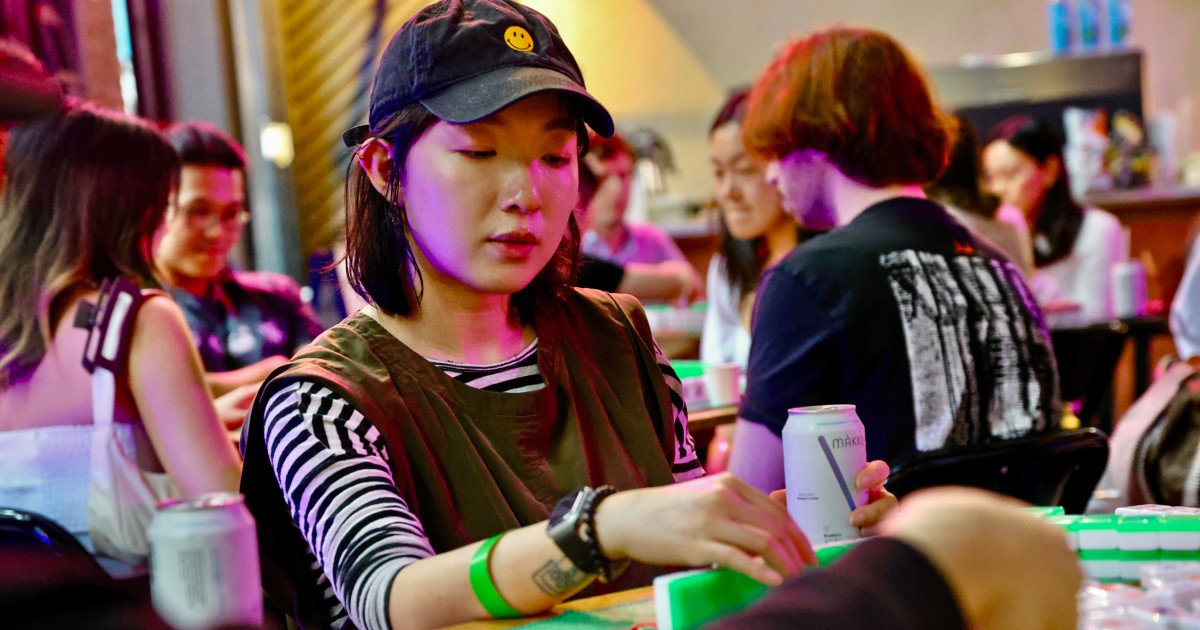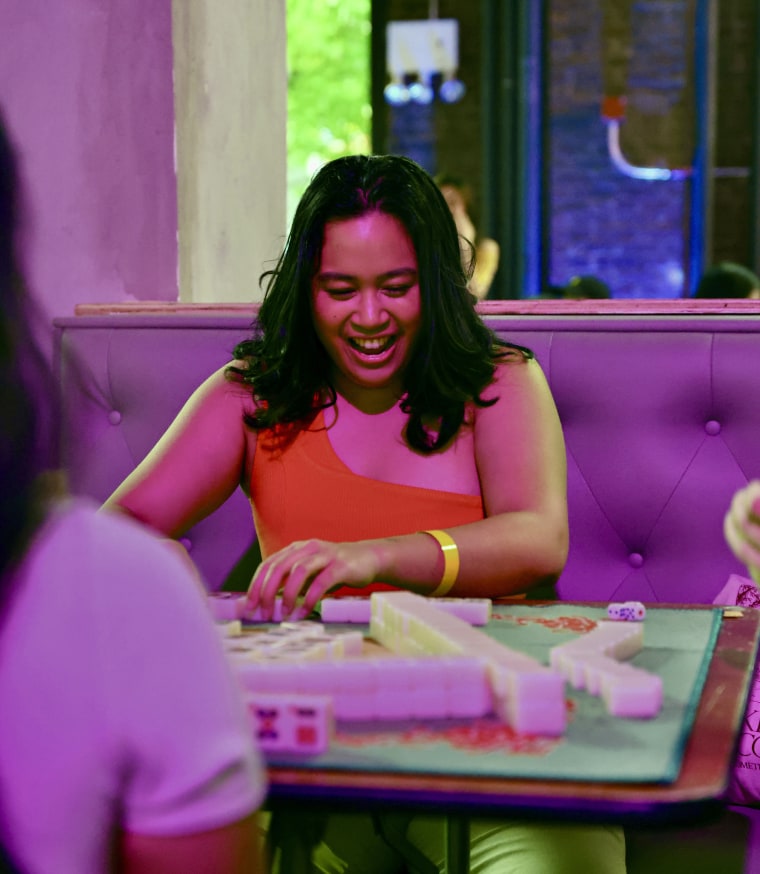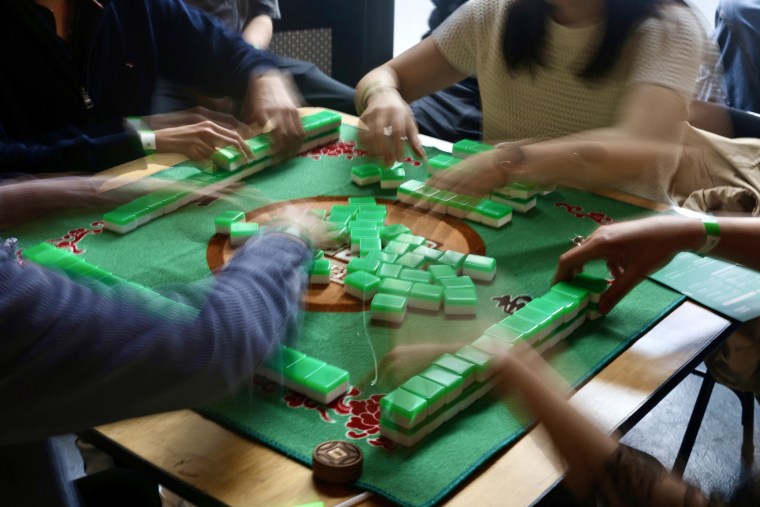Tech
NYC’s hottest social club is a mahjong tournament

When players enter Hana House in downtown Brooklyn, New York, they hear mahjong before they see it: a staccato waterfall of plastic clacking together. It’s been the background soundtrack in many Asian households for over two centuries since the four-person tile game was invented in China. But today’s scene is a far cry from an auntie’s living room.
Enter Green Tile Social Club, New York City’s hot mahjong social club, which celebrated its second anniversary at Hana House this weekend. A DJ spins electronic dance tracks and over 100 players bob to the music. Tea is swapped for cocktails with soju, matcha syrup and lychee. Most surprisingly, a large swath of the crowd is under 30. And Green Tile has doubled the numbers of attendees since October from 4,000 to 8,000.
The self-described “untz untz mahjong extravaganza” is geared toward young people looking for a different kind of social gathering outside of or supplemental to traditional nightlife. It’s part of a larger New York City nightlife shake-up with members-only clubs becoming increasingly popular while Gen Zers are drinking less and less — a product of the pandemic shifting priorities and social habits.
“We see people drawn to events where they already know what’s going on — ‘if you know, you know’ events,” Bowen Goh, co-owner of Mood Ring, a Bushwick bar, said.
Mahjong is more than just a replacement for the bar trivia night. Players have to make combos of matching tiles or successive tiles to win. It’s often compared to poker or rummy. The Green Tile tournament — where players don’t just have to win each round, but are scored on the difficulty of the winning hand and the way they won — can get heated.
But it never was about winning. Green Tile is among other party collectives, Asian-themed bars and pop-ups that are all centering social life around the Asian American community and giving the culture a modern twist.
When Goh opened Mood Ring in 2017, “there were no Asian American-owned venues or focused parties. I wouldn’t say we spearheaded it, but we were on the earlier side promoting it,” he said. “There’s just greater demand for it now among venues, creators and performers.” The bar is now a staple of Asian nightlife in the city.
In many ways the Green Tile after-party is a who’s who of the cool Asian kid scene — people show off Asian streetwear brands, vintage qipaos and culturally-inspired tattoos.

“During the pandemic, two full years we spent a lot of time thinking about ourselves and rediscovering identity. I think a lot of people came out of that period with a new lens on [heritage],” Green Tile co-founder Ernest Chan said. “And I think there’s also a lot of Asian hate that came along with that moment, and I think that drove a lot of inner work … and reaching to the community for support. And I think that big driving factor is like why there’s so much more representation today.”
What started as four friends who wanted to find other players their age has turned into monthly Sunday meetups and ticketed after-parties and supper clubs in the two years since the club was founded.
Beginners and serious tournament players alike all have a space at the table. A friend brought Akiko Barreras to her first Green Tile event a year ago, and she’s been hooked since.
“I’ve met a lot of friends in this club, enough to invite them to my birthday party,” she said.
A big focus among players is addressing the unique challenge of passing down cultural practices within Asian households.
“I always saw my parents playing this game with other people, but I never hopped in, though, because they all speak Chinese. I don’t speak Chinese at all so that was always a barrier,” first-time player Thomas Shen said. Still, in his first game at Green Tile, Shen managed to beat out more experienced players.
“Now I kind of understand why [my parents] shouted all this stuff,” the 22-year-old said with a big winner’s grin on his face.
It’s easy to be intimidated, like Shen, by the Chinese characters and rules of the game. But even experienced players don’t know everything about the game because it’s evolved a lot over hundreds of years.
“There are different versions that people play in our club. We do have people of Asian descent of all different types,” co-founder Sarah Teng said. “Some people come in and they’re like, ‘Oh, I know Japanese riichi,’ and they teach the table that they’re sitting at how to play.”

They settled on a Cantonese style as the most accessible between all the different editions. Embracing the wider Asian community outside of just Chinese players has led to runaway success on social media. They’ve even had Bowen Yang of “Saturday Night Live” show up. But the founders say they’ll know they’ve made it big when Michelle Yeoh sits down at one of their tables.
“I really want us to get to a point where we’re seen as just like any other ordinary game, like, you know, how chess is so ingrained in American culture that you see chess tables literally in every single park in New York City. I want us to get there with mahjong,”co-founder Grace Liu said.
But until they have their “Queen’s Gambit” moment, it’s a hard focus on social play. This summer, they’re hosting a speed dating event (they’re very proud of a couple matchmaking success stories) and mahjong in the garden series.
“We really feel like there is a mahjong renaissance happening and we are really happy that we get to be a part of that,” Teng said.
For more from NBC Asian America, sign up for our weekly newsletter.








